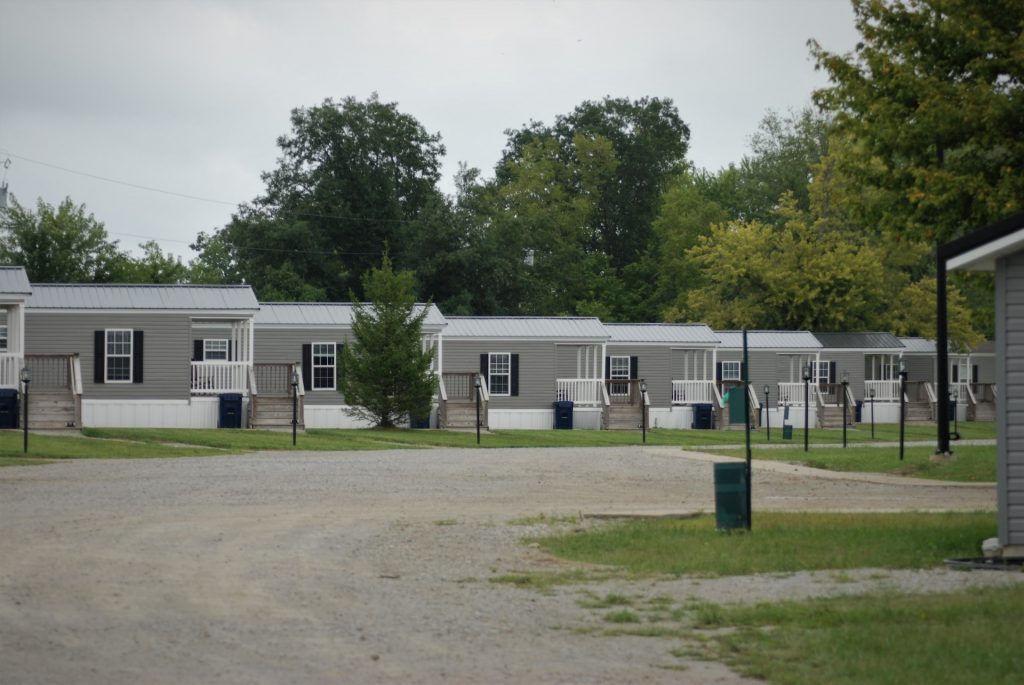Moving a mobile home is no small task. It requires careful planning, a solid understanding of the process, and a good grasp of potential costs. While hiring a professional service is always an option, it can be expensive, often costing thousands of dollars. This is why grasping how to move a mobile home for free becomes crucial. It might seem overwhelming initially, but it’s achievable with the right resources and information.
The following sections will also address additional topics, such as how to build steps for a mobile home and how to use concrete runners for the mobile home. This knowledge will save you significant money and equip you with the skills and understanding to ensure a smooth, hassle-free move.
Why Move to a Mobile Home?
There are several compelling reasons why individuals may move to a mobile home. One of the most prevalent is the financial aspect. Mobile homes are far more affordable than traditional, stick-built homes, making homeownership more accessible to a broader range.
In addition to cost, mobile homes offer flexibility that stationary homes simply cannot. A mobile home can be an excellent option for those who love travel or a job requiring frequent moves. It provides the comfort and stability of a home base without tying the homeowner down to a specific geographic location.
Another reason people gravitate towards mobile homes is the sense of community often found in mobile home parks. These communities provide a supportive, close-knit environment that many people find appealing. Lastly, with advancements in design and construction, today’s mobile homes can be just as comfortable and aesthetically pleasing as their traditional counterparts. They offer a variety of floor plans and customization options, allowing homeowners to shape their living space according to their preferences.
Know About Mobile Home
A mobile home, also known as a manufactured home or trailer, is a type of residential structure that can be easily moved, though it is often placed in a semi-permanent locale and left there for many years. These homes are pre-constructed in factories and then transported to their desired location. They’re built on a permanently attached chassis with highway-grade wheels and tires, which can be hidden once the home is installed at a residential site.
One key characteristic of mobile homes is their affordability compared to traditional houses. This cost-effective housing option provides the same basic amenities as a conventional home, such as bedrooms, a kitchen, and bathroom facilities, but at a fraction of the price. Mobile homes also offer flexibility of location; they can be easily relocated if necessary, making them an ideal choice for those who enjoy changing scenery or have jobs that require frequent relocation.
Despite these benefits, it’s important to note that mobile homes differ from traditional houses in a few ways. Traditional homes, also known as stick-built homes, are constructed onsite and tend to have a more solid foundation, making them more resistant to adverse weather conditions. They also often come with a plot of land, which can be appreciated over time. On the other hand, mobile homes are less likely to enjoy and may require a space rental in a mobile home park if the owner does not own the land.
Advantages of Living in a Mobile Home
Living in a mobile home comes with a multitude of benefits. First and foremost, the cost of buying and maintaining a mobile home is significantly lower compared to traditional homes. This makes them ideal for first-time homebuyers, retirees, or those on a tight budget. The compact size also means fewer maintenance requirements and lower utility bills.
Mobile homes offer unparalleled flexibility. If you get a new job in a different city or simply desire a change of scenery, you can relocate your home relatively quickly. This flexibility extends to the home’s design as well, with many manufacturers offering customizable designs to suit specific needs and tastes.
Moreover, mobile homes foster a sense of community. Many mobile home parks have communal amenities and host community events, creating a tight-knit and supportive environment.
Challenges of Living in a Mobile Home
Despite the numerous benefits, living in a mobile home is also associated with challenges. One of the primary concerns is the potential for decreased value over time. Compared to traditional homes, mobile homes often depreciate, meaning they may not be the best investment for those looking to build equity.
Additionally, while mobile homes can be moved, the process is sometimes straightforward, costly, and time-consuming. Furthermore, once a mobile home is set up in a park, it may be subject to park rules and monthly lot rent, which can increase over time.
Lastly, while construction standards for mobile homes have greatly improved over the years, traditional homes still generally offer better protection against severe weather conditions. This can lead to higher insurance costs for mobile homeowners in certain areas.
Definitive Guide To Move Mobile Home For Free
While it’s essential to remember that moving a mobile home for free may not be entirely achievable due to unavoidable costs, such as permits or tolls, there are ways to minimize expenditures significantly. Here is a comprehensive guide:
Planning the Move
The first and perhaps most crucial step in moving a mobile home is meticulous planning. It begins with deciding on a moving date that suits your circumstances and aligns with the availability of necessary resources. Remember, moving can take several weeks, so it’s wise to start planning early.
Next, consider the new location. Research the area, local amenities, rules, and regulations of the mobile home park (if applicable), and ensure a plot is secured before you start the move. Ensure the site is ready for the mobile home’s arrival, with utilities and a foundation prepared.
An essential aspect of planning is understanding the local laws and regulations about mobile home transport. Different jurisdictions have different rules, and you may need to secure a permit before initiating the move. It’s also a good idea to familiarize yourself with any route restrictions for moving oversized loads.
Finally, plan for any potential expenses. While the aim is to move for free, some unexpected costs could arise. These might include utility setup fees at the new location, park application fees, or unexpected repairs. Having a contingency fund in place will ensure that you’re prepared for any unexpected costs.
Finding Resources and Volunteers
One of the key ways to offset the cost of moving a mobile home is by leveraging available resources and seeking help from volunteers. Begin by reaching out to friends, family, or neighbors who might be willing to lend a hand. They can assist with packing, loading, and unloading items, saving you the cost of hiring professional movers.
In terms of resources, you may already have several items that can be of great use during the move. Packing materials like boxes, bubble wrap, or old newspapers can be found in many households. For larger items, consider borrowing equipment such as dollies or furniture sliders.
Furthermore, if your mobile home requires minor repairs before the move, consider doing them yourself or enlisting the help of handy friends or family rather than hiring a professional. Numerous do-it-yourself tutorials available online can guide you through simple repairs.
Bear in mind, though, that while volunteers can be beneficial, they’re not professional movers. Be mindful of their safety, and don’t ask them to assist with tasks that may be dangerous or beyond their ability.
Lastly, leverage your network and local community. You may find someone with a truck or trailer suitable for moving a mobile home and willing to lend it or offer their services at a lower cost. Check community boards or online marketplaces for resources and potential volunteers. Remember, the goal is to keep costs as low as possible while ensuring a safe and efficient move.
Self-Moving vs. Professional Services
One of the crucial decisions you’ll need to make when moving a mobile home is whether to undertake the move yourself or to hire professional services. Both options have pros and cons, and the choice largely depends on factors like your budget, time constraints, and comfort level with overseeing such a large-scale project.
Self-Moving
Moving your mobile home can be cost-effective, primarily if you can recruit friends or family members to help. With the proper planning and coordination, a self-move can save you significant money. Another advantage is that you have complete control over the moving process, from timing to handling your belongings. However, a self-move also comes with substantial responsibilities. Besides the heavy lifting, you must research and comply with all relevant laws and regulations, secure necessary permits, and handle unexpected issues. Moreover, self-moving a mobile home requires specific knowledge and skills, particularly when safely securing the house for transport and correctly setting it up at the new location.
Professional Services
On the other hand, hiring professional movers can relieve much of the stress associated with moving a mobile home. These companies have the experience, expertise, and equipment to handle the move efficiently. They are familiar with the legalities of transporting mobile homes, can secure all necessary permits, and have insurance to cover any damages that may occur during the move. However, the convenience of professional services comes at a cost, which can be substantial. Also, you’ll need to work around the movers’ schedule, which may not align perfectly with your own.
Tips for Reducing Costs
Even without the possibility of moving your mobile home completely free, there are still several ways to reduce costs significantly. Here are some practical tips:
- Compare Quotes: If you use a professional mover, get quotes from multiple companies. This will allow you to compare prices and services and choose the most cost-effective option.
- Off-Peak Moving: Moving companies often charge more during peak moving times, such as weekends or at the end of the month. If possible, plan your move for a weekday or during off-peak seasons to avail lower rates.
- Discard Unnecessary Items: The weight and size of your mobile home can affect the moving cost. Before you move, thoroughly purge items you no longer need or use. Selling these items could also generate some extra cash to offset moving expenses.
- Do-It-Yourself Where Possible: Wherever feasible, consider doing tasks yourself rather than hiring professionals. This could include packing, cleaning, minor repairs, and setting up utilities at your new location.
- Tax Deductions: In some cases, moving expenses can be tax-deductible, particularly if the move is related to starting a new job. Consult with a tax professional to understand if you qualify for these deductions.
Remember, the goal is to minimize costs without compromising the safety and integrity of your mobile home during the move. Always balance cost savings with the risks involved.
Safety Measures During the Move
Ensuring safety during the move is paramount. Below are several measures to consider:
- Secure Loose Items: Before the move, secure all loose items inside and outside the mobile home. Inside, this means packing away unsecured belongings to prevent damage during transit. Outside, remove and safely pack items like steps, skirting, and awnings.
- Prepare the Home for Transport: To prevent damage, mobile homes must be adequately prepared for transport. This includes disconnecting utilities, removing or securing exterior features, and properly sealing doors and windows.
- Use the Right Equipment: Utilize appropriate equipment to secure the mobile home during transport. This includes high-quality tow chains, wheel chocks, and tie-downs. Never compromise on the quality of these items, as they ensure your mobile home remains immobile during transit.
- Hire a Professional if Necessary: If the move feels beyond your skill level, it may be safer to hire a professional. While there is a cost associated with this, it could save you from costly repairs due to improper handling during the move.
- Consider the Weather: Plan your move around the weather forecast. Avoid moving during severe weather conditions, such as heavy rain, snow, or high winds, making the move more dangerous.
- Prioritize Road Safety: If you’re transporting the mobile home yourself, drive cautiously and obey all traffic laws. Ensure your vehicle’s lights and signals are working correctly and that your mobile home is also properly lit.
Remember, while the goal is to move your mobile home cost-effectively, safety should never be compromised. Taking the necessary precautions to ensure a safe and successful move is essential.
Bottom Line
Moving a mobile home, while a significant undertaking, can be made more cost-effective through careful planning and resourcefulness. Early and detailed planning, including understanding local laws, securing a plot, and preparing for potential expenses, is critical. Leveraging available resources, seeking help from volunteers, and using personal networks can significantly decrease costs.
The decision between self-moving and hiring professional services depends on individual factors such as budget, time constraints, and comfort level with managing such a project. Regardless of the chosen method, safety should never be compromised. Efficient cost reduction strategies can be employed to minimize expenses further by comparing quotes, moving during off-peak times, discarding unnecessary items, and tax deductions. Ultimately, the goal is to ensure a safe, efficient, and cost-effective move of your mobile home.



